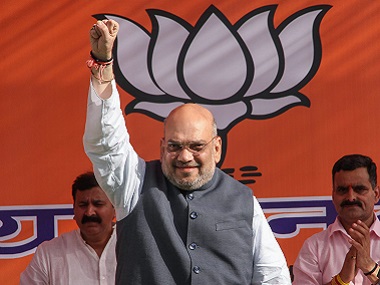Bharatiya Janata Party (BJP) National President Amit Shah’s
high-profile rally in Jammu on Saturday to observe the death anniversary of Syama Prasad Mookerjee — founder of the BJP’s predecessor party Bharatiya Jana Sangh — might indicate an end to the special status of Jammu and Kashmir, which Mookerjee died demanding. If it comes to that, it could lead to great turbulence in the Kashmir Valley. Shah’s assertion that one of the chief bases of the BJP’s coalition pact with the Peoples Democratic Party (PDP) was that the state would be an ‘a-bhin’ (undifferentiated) part of India could be read by Kashmiris as a signal that the Centre is heading towards removing the constitutional provisions that
guarantee the state its special status . [caption id=“attachment_4580981” align=“alignleft” width=“380”] BJP National President Amit Shah at a rally in Jammu. PTI.[/caption] The BJP chief made several hard-hitting, and potentially controversial, statements in the course of his speech, one of which was that Mookerjee was murdered in jail in Jammu and Kashmir. This will also sound tendentious in the Kashmir Valley, as cadres of the Rashtriya Swayamsevak Sangh (RSS) have long maintained that Mookerjee was poisoned, but the state administration has always denied the claim that was never proved. Shah’s claim that Jammu and Kashmir joined India because of the efforts of the Praja Parishad, too, was controversial. It directly negated the role of Sheikh Abdullah, founder of the National Conference and former Jammu and Kashmir chief minister. It also seemed like a revision of history, for the Hindu Rajya Sabha had backed independence for the state under the maharaja in 1947. The Praja Parishad, which primarily evolved from the Sabha, was formed in November the same year largely to oppose Abdullah after he was given emergency powers. The Parishad wound down its activism after Abdullah’s arrest in 1953. Electoral groundwork Shah’s speech laid out his party’s election campaign for the Jammu region. He claimed that the PDP-led state government had discriminated against Jammu and Ladakh, though the Centre had sent plenty of funds. He further castigated the Congress — the BJP’s main rival in Jammu — alleging that senior leader
Ghulam Nabi Azad was on the same page as the Lashkar-e-Taiba chief. Shah attacked both the National Conference and the PDP, as well, saying that two families had ruled the state for years and had engaged in massive corruption. The BJP chief indicated that
Governor's Rule would remain enforced in the Valley, and that development projects would be implemented speedily. Moreover, while listing the supposed unfulfilled promises of the PDP-led government, Shah made the odd claim that Gujjars and Bakarwals were not given Scheduled Tribe status — they were when the state was under Governor’s Rule in 1992. It is the Pahadi community that demands Scheduled Tribe status to compete with Gujjars. Critical concern In case Shah’s emphasis on Mookerjee paves the way for the end of Jammu and Kashmir’s special status, it could spark a massive rebellion in the Kashmir Valley. It could also become an international issue at a time when a report by the United Nations has made
allegations of human rights abuses in the state. On the other hand, it would allow the BJP to go into the 2019 general elections asserting that it had fulfilled its longstanding agenda on this matter and the triple talaq issue. Mookerjee’s primary demand when he set up the Bharatiya Jana Sangh with RSS support was that there should be no special provisions for Jammu and Kashmir. He had also demanded a uniform civil code and the slogan “ek vidhan, ek nishan, ek pradhan” — meaning one constitution, one flag, one premier — in 1951. He had resigned the previous year from Jawaharlal Nehru’s inclusive all-party first Cabinet when the Republic was established. A separate constituent assembly was formed for Jammu and Kashmir in 1951, and the head of the state government was called prime minister until February 1964. The state also had — and continues to have — a separate flag. BJP ministers had created a hubbub by refusing to fly the state flag on their vehicles, or have it hoisted at public offices, when the PDP-BJP coalition was formed in 2015. An official notification was issued enforcing the rule that the state and national flags must be flown together. Since then, there has been speculation over whether
Article 35-A of the Indian Constitution would remain.
BJP chief Amit Shah accused the PDP-led Jammu and Kashmir government of discriminating against the Jammu and Ladakh regions.
David Devadas is an expert on politics and geopolitics. Formerly a Senior Fellow at the Nehru Memorial Museum and Library, Visiting Professor at Jamia Millia Islamia, and Political Editor of Business Standard, he is currently Distinguished Fellow at the Institute for Social Sciences. He has written books on Kashmir, on youth, and on history. He has been a radio compere, guest faculty at JNU's Academic Staff College, St Stephen's College and Hindu College. He has worked for the Indian Express, The Hindustan Times, India Today, The Economic Times and Gulf News. His most impactful article, on a murder cover-up, prevented a Congress President from becoming prime minister. One led to the closure of an airline, and another created a furore and consequent clean-up in Delhi's health department. Several have correctly predicted election results in key states, and a series of reports from Srinagar made the government aware of how unsettled the situation there was in 1990. He is an alumnus of St Xavier's School, St Stephen's College, and the Indian Institute of Mass Communication. He has lived for extended periods in Geneva and Berlin, and has traveled to almost 50 countries. He enjoys various kinds of music, theatre, design, architecture and art. see more


)
)
)
)
)
)
)
)
)



